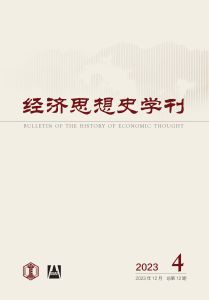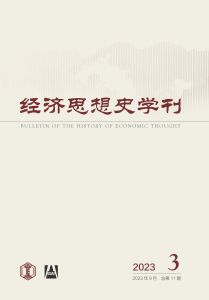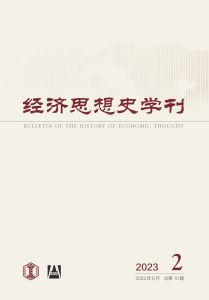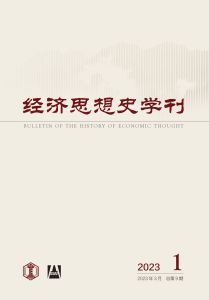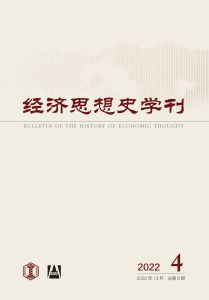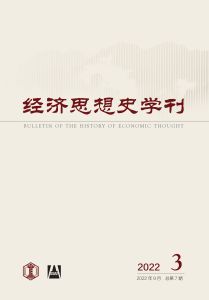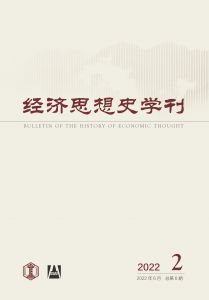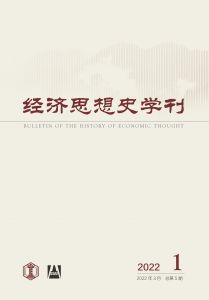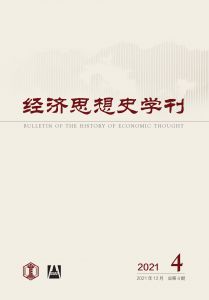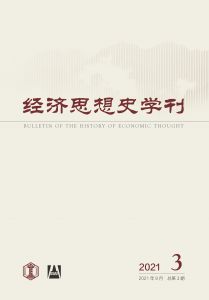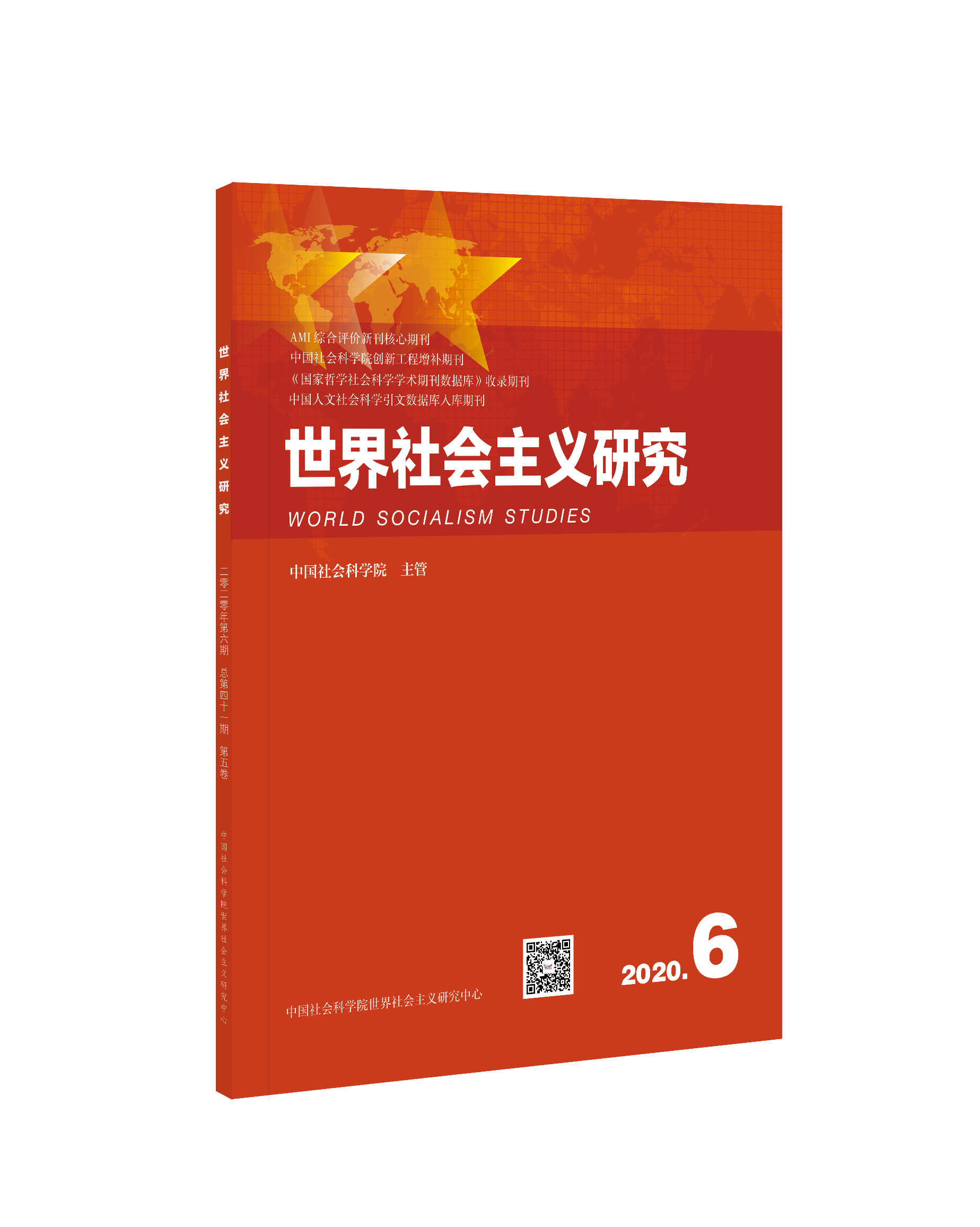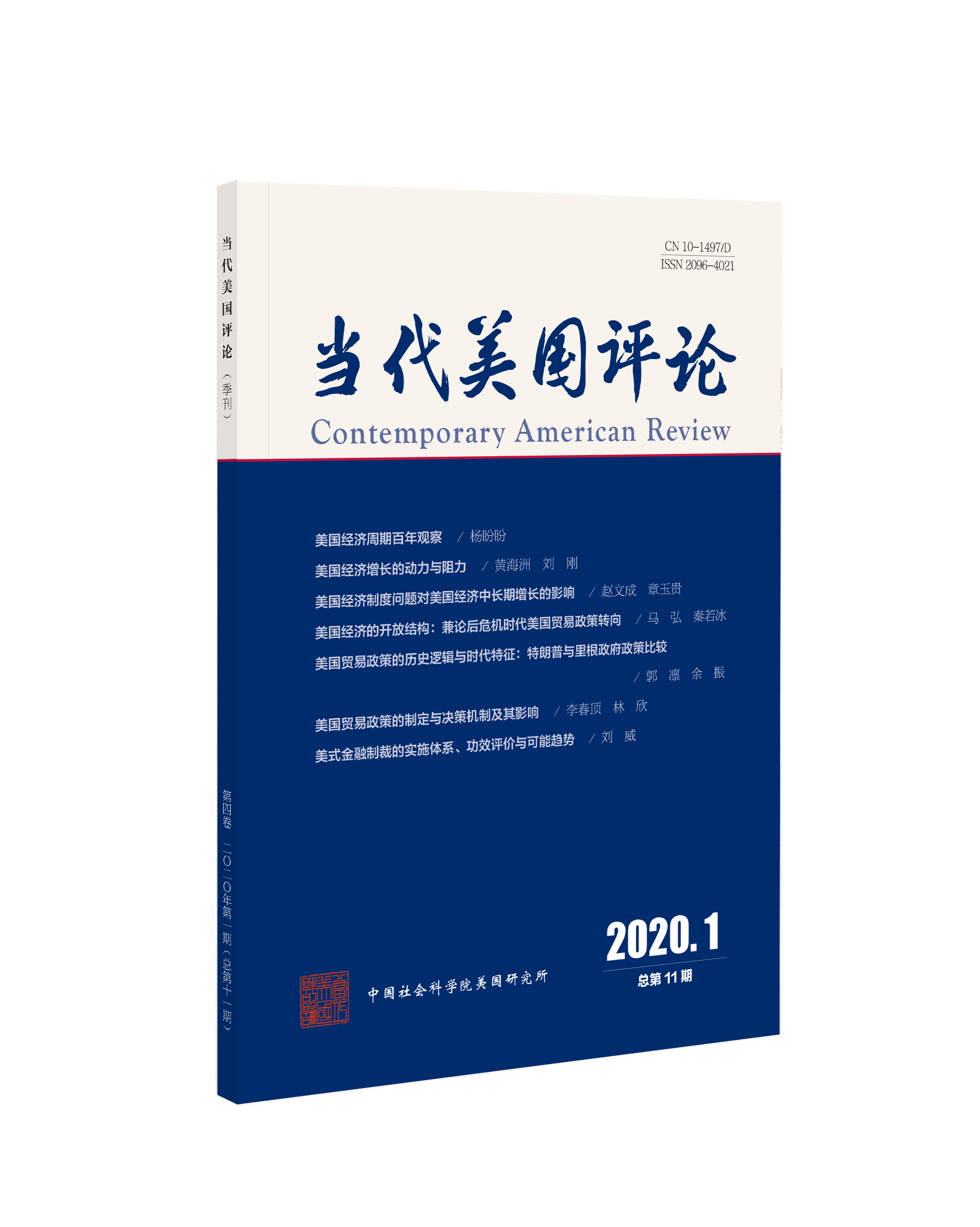最新期刊
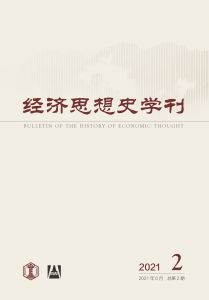
目录
过往期刊
参考文献
-
编辑委员会
-
万物理论:以马尔萨斯为源头的人口-经济关系理论
-
一、贫困陷阱理论的直接源头
-
二、二元经济发展模式的思想渊源
-
三、长期停滞理论的历史逻辑
-
四、中国发展实践的理论对应性
-
五、如何活用已故经济学家的思想?
-
-
论加强经济政策史和经济政策思想史的研究
-
一、经济政策史和经济政策思想史的概念及其研究状况的历史发展
-
二、经济思想史学界有关经济思想史研究主要对象的争论
-
三、经济政策作为经济思想史研究的主要对象及其研究目的
-
四、经济政策史与经济政策思想史的研究内容、框架和意义
-
-
日本的农业结构政策、农业发展困境及镜鉴意义
-
一、“基本法农政”及其实效
-
二、农业结构政策失灵的后果
-
三、日本农业结构政策失灵的主要原因
-
四、日本农业保护面临的国际冲击
-
五、日本农业现状对中国农业政策的镜鉴意义
-
-
价值转形与置盐定理:一个批评和自我批评
-
一、鲍特基维茨的失误:一个再考察
-
二、从价值转形到置盐定理
-
三、马克思框架内的置盐效应
-
四、结语
-
-
弗里德里希·李斯特学说的德国、法国、美国来源
-
一、德国的官房学派
-
二、法国的科尔贝主义
-
三、美国的“美利坚体制”
-
四、结论:李斯特创新何在?
-
-
科学革命视野下的行为经济学:革命性意涵与改良主义发展策略
-
一、引言
-
二、科学革命的理论:一个概念框架
-
三、行为经济学的革命性
-
四、行为经济学的兴起:从革命到改良的重新定位
-
五、总结
-
-
《经济思想史学刊》征稿启事
-
版权页
按年份浏览:
- 全部
- 2023
- 2022
- 2021
[1][1]蔡昉,2015,《二元经济作为一个发展阶段的形成过程》,《经济研究》第7期。
[2][2]蔡昉,2021,《双侧记:人口老龄化如何影响中国经济增长?》,载吴敬琏主编《比较》第2辑(总第113辑),中信出版社。
[3][3]凯恩斯,J. M.,1997,《凯恩斯文集·精英的聚会》,刘玉波、董波译,江苏人民出版社。
[4][4]克鲁格曼,保罗,2020,《我的工作方法》,载保罗·克鲁格曼《克鲁格曼的经济学讲义》,余江译,中信出版社。
[5][5]拉尔,迪帕克,1992,《“发展经济学”的贫困》,葛卫明等译,云南人民出版社。
[6][6]马尔萨斯,1962,《政治经济学原理》,厦门大学经济系翻译组译,商务印书馆。
[7][7]马尔萨斯,2007,《人口原理》,丁伟译,敦煌文艺出版社。
[8][8]莫克尔,乔尔,2020,《启蒙经济:英国经济史新论》,曾鑫、熊跃根译,中信出版社。
[9][9]Bass,Hans H. 2009. “Ragnar Nurkse’s Development Theory:Influences and Perceptions.” In Ragnar Nurkse (1907-2007):Classical Development Economics and its Relevance for Today ,edited by Rainer Kattel,Jan A. Kregel,and Erik S. Reinert,pp.183-202. London/New York/Delhi:Anthem Press.
[10][10]Bloom,David E.,David Canning,and Jaypee Sevilla. 2002. The Demographic Dividend:A New Perspective on the Economic Consequences of Population Change . Santa Monica,CA:RAND.
[11][11]Cai,Fang. 2016. China’s Economic Growth Prospects:From Demographic Dividend to Reform Dividend . Cheltenham,UK:Edward Elgar.
[12][12]Caldwell,John C. 1976. “Toward a Restatement of Demographic Transition Theory.” Population and Development Review 2(3/4):321-366.
[13][13]Department of Economic and Social Affairs. 2013. National Transfer Accounts Manual:Measuring and Analysing the Generational Economy (Preliminary Version May 2013),United Nations,ESA/P.WP/226. Accessed February 13,2021. https://www.un.org/en/development/desa/population/publications/pdf/development/NTA_Manual_12June2013.pdf.
[14][14]Eggertsson,Gauti B.,Manuel Lancastre,and Lawrence H. Summers. 2019. “Aging,Output Per Capita,and Secular Stagnation.” American Economic Review:Insights 1(3):325-342.
[15][15]Hansen,Alvin. 2004. “On Economic Progress and Declining Population Growth.” Population and Development Review 30(2):329-342.
[16][16]Hollander,Samuel. 2017. “Thomas Robert Malthus (1766-1834).” In The Palgrave Companion to Cambridge Economics ,edited by Robert A. Cord,pp.233-256. London:Palgrave Macmillan.
[17][17]Kattel,Rainer,Jan A. Kregel,and Erik S. Reinert. 2009. “The Relevance of Ragnar Nurkse and Classical Development Economics.” In Ragnar Nurkse (1907-2007):Classical Development Economics and its Relevance for Today ,edited by Rainer Kattel,Jan A. Kregel,and Erik S. Reinert,pp.1-28. London/New York/Delhi:Anthem Press.
[18][18]Keynes,John Maynard. 1978. “Some Economic Consequences of a Declining Population.” Population and Development Review 4(3):517-523.
[19][19]Krugman,Paul. 1994. “The Fall and Rise of Development Economics.” Accessed December 12,2020. http://web.mit.edu/krugman/www/dishpan.html.
[20][20]Kukk,Kalev,and Kalle Kukk. 2009. “Life and Time of Ragnar Nurkse.” In Ragnar Nurkse (1907-2007):Classical Development Economics and its Relevance for Today ,edited by Rainer Kattel,Jan A. Kregel,and Erik S. Reinert,pp.29-52. London/New York/Delhi:Anthem Press.
[21][21]Lewis,W. Arthur. 1954. “Economic Development with Unlimited Supplies of Labour.” The Manchester School 22(2):139-191.
[22][22]Summers,Lawrence H. 2016. “The Age of Secular Stagnation:What It Is and What to Do About It.” Foreign Affairs 95(2):2-9.
[23][23]Summers,Lawrence H. 2018. “Secular Stagnation and Macroeconomic Policy.” IMF Economic Review 66(2):226-250.
[24][24]安德森,埃斯本,2013,《约瑟夫·熊彼特》,苏军译,华夏出版社。
[25][25]布劳格,马克,2009,《经济理论的回顾》,姚开建译,中国人民大学出版社。
[26][26]丁涛、贾根良,2018,《流行的经济学思潮与经济政策制定者的辨别力——基于18世纪英法〈伊甸条约〉的案例研究与当代启示》,《经济纵横》第4期。
[27][27]多德,道格拉斯,2008,《资本主义经济学批评史》,熊婴、陶李译,江苏人民出版社。
[28][28]傅伟勋,1989,《从西方哲学到禅佛教》,生活·读书·新知三联书店。
[29][29]高柏,2008,《经济意识形态与日本产业政策——1931—1965年的发展主义》,安佳译,上海人民出版社。
[30][30]哈奇森,特伦斯·W.,1992,《经济学的革命与发展》,李小弥等译,北京大学出版社。
[31][31]汉森,N.R.,1988,《发现的模式——对科学的概念基础的探究》,邢新力、周沛译,中国国际广播出版社。
[32][32]贾根良,2004,《演化经济学——经济学革命的策源地》,山西人民出版社。
[33][33]贾根良,2010,《“新经济思想史”刍议》,《社会科学战线》第1期。
[34][34]贾根良,2015,《甲午战争败于晚清领导集团的发展战略观——贾根良教授访谈录》,《管理学刊》第2期。
[35][35]贾根良,2016,《打造中国的经济思想史学派》,《中国社会科学报》1月12日。
[36][36]贾根良,2017,《重商主义、工业文化的诞生与英国工业革命》,载彭南生、严鹏主编《工业文化研究》第1辑(总第1辑),社会科学文献出版社。
[37][37]贾根良,2018,《不对称全球化:历史、理论与当代中国》,《南国学术》第4期。
[38][38]贾根良、兰无双,2017,《经济学学界史:经济思想史新的研究对象与目的》,《教学与研究》第6期。
[39][39]贾根良、兰无双,2019,《经济学学界史的问题意识、方法论与研究意义》,《经济学家》第1期。
[40][40]贾根良、李黎力,2010,《浅议经济思想史观与经济思想史研究方法论——兼评马克·布劳格的〈经济理论的回顾〉》,《当代经济研究》第4期。
[41][41]贾根良等,2017,《美国学派与美国19世纪内需主导型工业化道路研究》,中国人民大学出版社。
[42][42]贾子尧,2018,《熊彼特经济思想史学理论研究》,博士学位论文,中国人民大学经济系。
[43][43]赖纳特,埃里克·S.,2005,《国家在经济增长中的作用》,载杰弗里·M.霍奇逊主编《制度与演化经济学现代文选:关键性概念》,贾根良等译,高等教育出版社。
[44][44]赖纳特,埃里克·S.、贾根良主编,2007a,《穷国的国富论:演化发展经济学论文选》(上),贾根良等译,高等教育出版社。
[45][45]赖纳特,埃里克·S.、贾根良主编,2007b,《穷国的国富论:演化发展经济学论文选》(下),贾根良等译,高等教育出版社。
[46][46]李斯特,弗里德里希,1961,《政治经济学的国民体系》,陈万煦译,商务印书馆。
[47][47]李斯特,弗里德里希,1997,《政治经济学的自然体系》,杨春学译,商务印书馆。
[48][48]里马,英格里德·H.,2016,《经济分析史》,陈勇勤、刘星译,中国人民大学出版社。
[49][49]刘勉玉主编,2001,《中国共产党经济政策发展史》,湖南人民出版社。
[50][50]马伯煌主编,1993,《中国经济政策思想史》,云南人民出版社。
[51][51]马赛厄斯,彼得、悉尼·波拉德主编,2004,《剑桥欧洲经济史》第8卷《工业经济:经济政策和社会政策的发展》,王宏伟等译,经济科学出版社。
[52][52]司马光,1990,《进书表》,载司马光编纂《资治通鉴》第4册,岳麓书社。
[53][53]巫宝三,2003,《论经济思想史的研究对象、方法和意义》,载中国社会科学院科研局组织编选《巫宝三集》,中国社会科学出版社。
[54][54]熊彼特,伊丽莎白·波蒂,2009,《经济分析史·编者绪论》,载约瑟夫·熊彼特《经济分析史》第1卷,朱泱等译,商务印书馆。
[55][55]熊彼特,约瑟夫,2001,《经济分析史》第1卷,朱泱等译,商务印书馆。
[56][56]张林,2007,《经济思想史事件研究的价值和方法》,载顾海良、颜鹏飞主编《经济思想史评论》第2辑(总第2辑),经济科学出版社。
[57][57]张林、周济民,2020,《中国特色社会主义政治经济学史的书写新范式》,《思想战线》第4期。
[58][58]张夏准,2007,《富国陷阱:发达国家为何踢开梯子?》,肖炼等译,社会科学文献出版社。
[59][59]钟祥财,2015,《关于经济史学的几个问题》,《上海经济研究》第1期。
[60][60]朱英、石柏林,1998,《近代中国经济政策演变史稿》,湖北人民出版社。
[61][61]Baumgartner,Frank R. 2014. “Ideas,Paradigms and Confusions.” Journal of European Public Policy 21(3):475-480.
[62][62]Blaug,Mark. 2001. “No History of Ideas,Please,We’re Economists.” Journal of Economic Perspectives 15(1):145-164.
[63][63]Carson,M. 2004. From Common Market to Social Europe?Paradigm Shift and Institutional Change in European Union Policy on Food,Asbestos and Chemicals,and Gender Equality . Stockholm:Stockholm University.
[64][64]Chalk,Alfred F. 1958. “Schumpeter’s Views on the Relationship of Philosophy and Economics.” Southern Economic Journal 24(3):271-282.
[65][65]Coats,A. W. 1993. The Sociology and Professionalization of Economics:British and American Economic Essays,Volume II . London/New York:Routledge.
[66][66]Daigneault,Pierre-Marc. 2014. “Puzzling about Policy Paradigms:Precision and Progress.” Journal of European Public Policy 21(3):481-484.
[67][67]Gordon,Donald F. 1965. “The Role of the History of Economic Thought in the Understanding of Modern Economic Theory.” The American Economic Review 55(1/2):119-127.
[68][68]Hall,Peter A. 1993. “Policy Paradigms,Social Learning,and the State:The Case of Economic Policymaking in Britain.” Comparative Politics 25(3):275-296.
[69][69]Letwin,William. 2007. American Economic Policy from the Revolution to the New Deal . New Brunswick:Aldine Transaction.
[70][70]Meek,R. L. 1957. “Is Economics Biased?A Heretical View of a Leading Thesis in Schumpeter’s History.” Scottish Journal of Political Economy 4(1):1-17.
[71][71]Mirowski,Philip. 1984. “Physics and the ‘Marginalist Revolution’.” Cambridge Journal of Economics 8(4):361-379.
[72][72]Perlman,Mark. 1986. “Perceptions of our Discipline:Three Magisterial Treatments of the Evolution of Economic Thought.” History of Economics Society Bulletin 7(2):9-28.
[73][73]Popescu,O. 1964,“On the Historiography of Economic Thought:A Bibliographical Survey.” Journal of World History 8(1):168-209.
[74][74]Richardson,G. B. 1955. “Schumpeter’s History of Economic Analysis.” Oxford Economic Papers 7 (2):136-150.
[75][75]Schumpeter,Joseph. 1954. Economic Doctrine and Method:An Historical Sketch ,trans. by R. Aris. New York:Oxford University Press.
[76][76]White,Lawrence H. 2012. The Clash of Economic Ideas:The Great Policy Debates and Experiments of the Last Hundred Years . New York:Cambridge University Press.
[77][77]陈仁安,2018,《日本农协改革新动向观察》,《世界农业》第1期。
[78][78]高强、孔祥智,2013,《日本农地制度改革背景、进程及手段的述评》,《现代日本经济》第2期。
[79][79]韩占兵,2014,《中国“农业接班人危机”:分析框架、现实判断与破解之道》,《南京农业大学学报(社会科学版)》第1期。
[80][80]何小勤,2013,《农业劳动力老龄化研究——基于浙江省农村的调查》,《人口与经济》第2期。
[81][81]胡霞,2009,《日本农业扩大经营规模的经验与启示》,《经济理论与经济管理》第3期。
[82][82]康伟立,2018,《从农业结构的视角分析日本农协改革》,《世界农业》第3期。
[83][83]李明权,2015,《日本FTA进程落后于韩国的原因探析——基于农业保护的政治经济学视角》,《日本学刊》第4期。
[84][84]刘泽莹、韩一军,2020,《乡村振兴战略下粮食供给面临的困境与出路》,《西北农林科技大学学报(社会科学版)》第2期。
[85][85]彭华、欧阳萍、李光跃、唐瑕苓,2014,《农业劳动力老龄化的困境与出路——来自四川省的实证》,《农村经济》第10期。
[86][86]朴京玉,2009,《日本农民年金制度对农地流转的影响》,《农村经济》第9期。
[87][87]升味准之辅,1997,《日本政治史》第4册,董果良、郭洪茂译,商务印书馆。
[88][88]王应贵,2015,《当代日本农业发展困境、政策扶持与效果评析》,《现代日本经济》第3期。
[89][89]项继权、周长友,2017,《“新三农”问题的演变与政策选择》,《中国农村经济》第10期。
[90][90]叶兴庆、翁凝,2018,《拖延了半个世纪的农地集中——日本小农生产向规模经营转变的艰难历程及启示》,《中国农村经济》第1期。
[91][91]袁淑宁、高赟,2020,《基于粮食安全背景下的传统小农经济现状》,《甘肃农业》第1期。
[92][92]岸康彦,2009,「新基本法農政の10年—何が変わったか—」,日本農業研究所研究報告『農業研究』第22号。
[93][93]本間正義,2018,「日本と台湾農業の20年後を問う—新たな食料産業の構築に向けて—」,『交流』No.924。
[94][94]本間正義、神門善久,2004,「日本農業の国際化と政治·農協の変革」,RIETI Discussion Paper Series 04-J-024。
[95][95]並松信久,2018,「戦時体制下の食糧政策と統制·管理の課題」,『京都産業大学論集(社会科学系列)』第35号。
[96][96]東井正美,1998,「農業基本法の意図と現実」,『関西大学商学論集』第43巻第2号。
[97][97]冨田洋三,2012,「TPPと日本農業の将来」,『実践女子大学生活科学部紀要』第49号。
[98][98]和田淳一郎,1995,「一票の平等について:経済学的視点から」,『公共選択の研究』第26号。
[99][99]暉峻衆三,2008,『日本の農業150年—1850~2000年—』,有斐閣ブックス。
[100][100]暉峻衆三,2009,「グローバリゼーション下日本が直面する食料·農業問題」,『聖学院大学総合研究所紀要』No.45。
[101][101]樫原正澄,1998,「戦後日本農政の転換と農業基本法の見直し」,『関西大学商学論集』第43巻第2号。
[102][102]林秀弥、西澤雅道,2015,「経済法と農協改革」,『法政論集』第264号。
[103][103]内田龍之介,2018,「農協改革とEPA対策:農業成長産業化の政治過程」,『政策創造研究』第12巻。
[104][104]農林水産省,2006,『平成18年度食料·農業·農村の動向-平成19年度食料·農業·農村施策』(農業白書)。
[105][105]農林水産省,2007,『平成18年度食料·農業·農村の動向』(農業白書)。
[106][106]農林水産省,2008,『平成19年度食料·農業·農村の動向』(農業白書)。
[107][107]農林水産省,2010,『平成21年度食料·農業·農村の動向-平成22年度食料·農業·農村施策』。
[108][108]農林水産省,2014,『平成25年度食料·農業·農村の動向』(農業白書)。
[109][109]橋本貴義,2009,「「所有」から「利用」中心の農地制度への再構築—農地法等改正案—」,『立法と調査』No.292。
[110][110]穐本洋哉,2003,「日本農業システムの史的展開」,『経済論集』第28巻第2号。
[111][111]山下一仁,2017,「日本農政の底流に流れる“小農主義”の系譜」,経済産業研究所RIETI Discussion Paper Series 17-J-040。
[112][112]山澤逸平,2015,「TPP,RCEPと日本のコメ政策」,『国際貿易と投資』No.102。
[113][113]田家邦明,2016,「30年産米からの生産調整の見直しとコメ市場について」,『農業研究』第29号。
[114][114]田林明、井口梓,2005,「日本農業の変化と農業の担い手の可能性」,『人文地理学研究』第29号。
[115][115]小林肇、飯山昌弘,2001,「農業基本法から食料·農業·農村基本法への移行」,『鳥取大学農学部研究報告』第54巻。
[116][116]小田切徳美,1999,「日本農政の総括と展望—農業基本法以降の農政展開—」,『土地制度史学』(別冊)。
[117][117]緒方賢一,2013,「2009年農地法改正における遊休農地対策規定とその適用の現段階」,『高知論叢(社会科学)』第106号。
[118][118]Mulgan,Aurelia George. 2015. “Understanding Japanese Trade Policy:A Political Economy Perspective.” In The Political Economy of Japanese Trade Policy ,edited by Aurelia George Mulgan,and Masayoshi Honma,pp.1-40. London:Palgrave Macmillan.
[119][119]冯金华,2014,《价值决定、价值转形和联合生产》,社会科学文献出版社。
[120][120]冯金华,2015,《价值的形成和实现:一个新的解释》,《学习与探索》第5期。
[121][121]冯金华,2020,《商品按价值出售与等量资本获得等量利润有矛盾吗?》,《中国经济问题》第6期。
[122][122]马克思,1974,《资本论》第3卷,载马克思、恩格斯《马克思恩格斯全集》第25卷,中共中央马克思恩格斯列宁斯大林著作编译局译,人民出版社。
[123][123]孟捷,1993,《〈国富论〉内在体系中的交换价值理论——从研究方法到叙述方法》,《经济学家》第5期。
[124][124]孟捷,2016,《历史唯物论与马克思主义经济学》,社会科学文献出版社。
[125][125]孟捷,2018a,《从“新解释”到价值转形的一般理论》,《世界经济》第5期。
[126][126]孟捷,2018b,《价值和积累理论》,社会科学文献出版社。
[127][127]孟捷、冯金华,2016,《非均衡与平均利润率的变化:一个马克思主义分析框架》,《世界经济》第6期。
[128][128]斯威齐,保罗,1997,《资本主义发展论——马克思主义政治经济学原理》,陈观烈、秦亚男译,商务印书馆。
[129][129]张衔、薛宇峰,2020,《对置盐定理的批判性解构》,《中国社会科学》第6期。
[130][130]置盐信雄,2018,《技术变革与利润率》,骆桢、李怡乐译,载孟捷主编《利润率的政治经济学》,社会科学文献出版社。
[131][131]Bortkiewicz,Ladislaus Von. 1952. “Value and Price in the Marxian System.” trans. by J. Kahane,International Economic Papers No.2,pp.5-60.
[132][132]Duménil,G. 1983. “Beyond the Transformation Riddle:A Labor Theory of Value.” Science and Society 47(4):427-450.
[133][133]Foley,Duncan K. 1982. “The Value of Money,the Value of Labor Power and the Marxian Transformation Problem.” Review of Radical Political Economics 14(2):37-47.
[134][134]Foley,Duncan K. 1986. Understanding Capital:Marx’s Economic Theory . Cambridge,Massachusetts/London,England:Harvard University Press.
[135][135]Itoh,Makoto. 1980. Value and Crisis:Essays on Marxian Economics in Japan . New York/London:Monthly Review Press.
[136][136]Morishima,Michio. 1973. Marx’s Economics:A Dual Theory of Value and Growth . Cambridge/London/New York/Melbourne:Cambridge University Press.
[137][137]恩格斯,弗里德里希,1965,《卡尔·马克思〈政治经济学批判〉》,载马克思、恩格斯《马克思恩格斯全集》第13卷,中共中央马克思恩格斯列宁斯大林著作编译局译,人民出版社。
[138][138]季德,夏尔、夏尔·利斯特,1986,《经济学说史》(上),徐卓英等译,商务印书馆。
[139][139]凯恩斯,约翰·梅纳德,2004,《就业、利息和货币通论(重译本)》,高鸿业译,商务印书馆。
[140][140]赖纳特,埃里克·S.,2010,《富国为什么富 穷国为什么穷》,杨虎涛等译,中国人民大学出版社。
[141][141]赖纳特,埃里克·S.、贾根良主编,2007,《穷国的国富论:演化发展经济学论文选》(下),贾根良等译,高等教育出版社。
[142][142]李斯特,弗里德里希,1997a,《政治经济学的国民体系》,陈万煦译,商务印书馆。
[143][143]李斯特,弗里德里希,1997b,《政治经济学的自然体系》,杨春学译,商务印书馆。
[144][144]李斯特,弗里德里希,1997c,《美国政治经济学大纲》,载弗里德里希·李斯特《政治经济学的自然体系》,杨春学译,商务印书馆。
[145][145]罗尔,埃里克,1981,《经济思想史》,陆元诚译,商务印书馆。
[146][146]马克思,卡尔,1979,《评弗里德里希·李斯特的著作〈政治经济学的国民体系〉》,载马克思、恩格斯《马克思恩格斯全集》第42卷,中共中央马克思恩格斯列宁斯大林著作编译局译,人民出版社。
[147][147]梅俊杰,2012,《译序·理当为历史上的重商主义者立传》,载伊奈丝·缪拉《科尔贝:法国重商主义之父》,梅俊杰译,上海远东出版社。
[148][148]梅俊杰,2014,《自由贸易的神话:英美富强之道考辨》,新华出版社。
[149][149]梅俊杰,2017,《重商主义真相探解》,《社会科学》第7期。
[150][150]梅俊杰,2019,《译序:弗里德里希·李斯特的回归》,载欧根·文得乐《弗里德里希·李斯特传》,梅俊杰译,商务印书馆。
[151][151]梅俊杰,2020a,《赶超发展先驱弗里德里希·李斯特传略》,《政治经济学报》第3期。
[152][152]梅俊杰,2020b,《法兰西帝国:重商主义的大陆强权》,载李伯重、韦森、刘怡等《枪炮、经济与霸权:谁在争夺世界经济的铁王座》,中国出版集团、现代出版社。
[153][153]梅俊杰,2021,《在赶超发展视野下重新解读李斯特经济学说》,《社会科学》第3期。
[154][154]欧文,道格拉斯,2013,《国富策:自由贸易还是保护主义?》,梅俊杰译,华东师范大学出版社。
[155][155]森哈斯,迪特,2019,《弗里德里希·李斯特与发展的基本问题》,梅俊杰译,《国外社会科学前沿》第12期。
[156][156]文得乐,欧根,2019,《弗里德里希·李斯特传》,梅俊杰译,商务印书馆。
[157][157]熊彼特,约瑟夫,1996a,《经济分析史》第1卷,朱泱等译,商务印书馆。
[158][158]熊彼特,约瑟夫,1996b,《经济分析史》第2卷,杨敬年译,商务印书馆。
[159][159]杨春学,1997,《政治经济学的自然体系·中译者前言》,载弗里德里希·李斯特《政治经济学的自然体系》,杨春学译,商务印书馆。
[160][160]朱绍文,2000,《经典经济学与现代经济学》,北京大学出版社。
[161][161]Cardoso,José Luís. 2019. “Friedrich List and National Political Economy:Ideas for Economic Development.” In The Economic Thought of Friedrich List ,edited by Harald Hagemann,Stephen Seiter,and Eugen Wendler,pp.46-57. London/New York:Routledge.
[162][162]Coustillac,Mechthild. 2019. “Friedrich List and France:The History of a Lifelong Engagement.” In The Economic Thought of Friedrich List ,edited by Harald Hagemann,Stephen Seiter,and Eugen Wendler,pp.74-85. London/New York:Routledge.
[163][163]Hagemann,Harald. 2019. “German,American and French Influences on List’s Ideas of Economic Development.” In The Economic Thought of Friedrich List ,edited by Harald Hagemann,Stephen Seiter,and Eugen Wendler,pp.58-73. London/New York:Routledge.
[164][164]Hamilton,Alexander. 2001. “Report on the Subject of Manufactures.” In Alexander Hamilton:Writings ,edited by Joanne B. Freeman,pp.647-734. New York:The Library of America.
[165][165]Henderson,W. O. 1982. “Friedrich List and the French Protectionists.” Journal of Institutional and Theoretical Economics 138(2):262-275.
[166][166]Henderson,W. O. 1983. Friedrich List:Economist and Visionary,1789-1846 . London:Frank Cass and Co. Ltd.
[167][167]Hirst,Margaret E. 1909. Life of Friedrich List,and Selections from His Writings . London:Smith,Elder & Co.,reprinted by Forgotten Books,2012.
[168][168]Knell,Mark. 2019. “Friedrich List and the American System of Innovation.” In The Economic Thought of Friedrich List ,edited by Harald Hagemann,Stephen Seiter,and Eugen Wendler,pp.179-197. London/New York:Routledge.
[169][169]Laue,Theodore H. Von. 1974. Sergei Witte and the Industrialization of Russia . New York:Atheneum.
[170][170]List,Friedrich. 1909a. “Extract from Professor List’s Speech.” In Life of Friedrich List,and Selections from His Writings ,edited by Margaret E. Hirst,p.273. London:Smith,Elder & Co.,reprinted by Forgotten Books,2012.
[171][171]List,Friedrich. 1909b. “Introduction to The National System of Political Economy .” In Life of Friedrich List,and Selections from His Writings ,edited by Margaret E. Hirst,p.287. London:Smith,Elder & Co.,reprinted by Forgotten Books,2012.
[172][172]Magnusson,Lars. 2015. The Political Economy of Mercantilism . London/New York:Routledge.
[173][173]Mann,Fritz K. 1951. “Review of Friedrich List by Carl Brinkmann.” The American Economic Review 41(3):432-433.
[174][174]Rössner,Philipp Robinson. 2019. “Manufacturing Matters:From Giovanni Botero (c.1544-1617) to Friedrich List(1789-1846),or:The History of an Old Idea.” In The Economic Thought of Friedrich List ,edited by Harald Hagemann,Stephen Seiter,and Eugen Wendler,pp.102-121. London/New York:Routledge.
[175][175]Spiegel,Henry W. 1991. The Growth of Economic Thought . Durham/London:Duke University Press.
[176][176]Szporluk,Roman. 1988. Communism and Nationalism:Karl Marx versus Friedrich List . Oxford:Oxford University Press.
[177][177]Tribe,Keith. 1995. Strategies of Economic Order:German Economic Discourse,1750-1950 . Cambridge:Cambridge University Press.
[178][178]Wendler,Eugen. 2015. Friedrich List (1789-1846):A Visionary Economist with Social Responsibility . Heidelberg:Springer.
[179][179]贝斯利,蒂姆等,2009,《为何经济学家不能预测危机——12名英国社会科学院会员给女王的信》,佚名译,《中国改革》第10期。
[180][180]波珀,K.R.,1986,《科学发现的逻辑》,查汝强、邱仁宗译,科学出版社。
[181][181]弗里德曼,米尔顿,2001,《弗里德曼文萃》(上),胡雪峰、武玉宁译,首都经济贸易大学出版社。
[182][182]富布鲁克,爱德华,2004,《导论:后我向思维经济学改革国际运动简史》,载爱德华·富布鲁克编《经济学的危机:经济学改革国际运动最初600天》,贾根良、刘辉锋译,高等教育出版社。
[183][183]卡尼曼,丹尼尔,2012,《思考,快与慢》,胡晓姣、李爱民、何梦莹译,中信出版社。
[184][184]凯莫勒,科林·F.、乔治·罗文斯坦,2010,《行为经济学:过去、现在和将来》,载科林·F.凯莫勒、乔治·罗文斯坦、马修·拉宾编《行为经济学新进展》,贺京同等译,中国人民大学出版社。
[185][185]库恩,T. S.,1982,《教条在科学研究中的作用》,乐成译,《科学与哲学》第1期。
[186][186]库恩,托马斯,2003,《科学革命的结构》,金吾伦、胡新和译,北京大学出版社。
[187][187]Lakatos,I.,1980a,《科学研究纲领方法论》,纪树立译,《世界科学译刊》第9期。
[188][188]Lakatos,I.,1980b,《判决性实验在科学中的作用》,金吾伦译,《世界科学译刊》第9期。
[189][189]马克思、恩格斯,2009,《马克思恩格斯文集》第2卷,中共中央马克思恩格斯列宁斯大林著作编译局编译,人民出版社。
[190][190]那艺、贺京同,2016,《行为经济学:新古典的继承与发展》,《中国社会科学报》2月24日。
[191][191]那艺、贺京同,2019a,《行为经济学的兴起及其与新古典经济学关系的演变》,《中国社会科学》第5期。
[192][192]那艺、贺京同,2019b,《行为经济学与实验经济学的学术分野》,《经济学动态》第7期。
[193][193]钱颖一,2002,《理解现代经济学》,《经济社会体制比较》第2期。
[194][194]饶育蕾、盛虎,2010,《行为金融学》,机械工业出版社。
[195][195]塞勒,理查德,2018,《“错误”的行为:行为经济学的形成》,王晋译,中信出版集团。
[196][196]森,阿玛蒂亚,2000,《伦理学与经济学》,王宇、王文玉译,商务印书馆。
[197][197]史莱佛,安德瑞,2003,《并非有效的市场——行为金融学导论》,赵英军译,中国人民大学出版社。
[198][198]田国强,2016a,《现代经济学的本质(上)》,《学术月刊》第7期。
[199][199]田国强,2016b,《现代经济学的本质(下)》,《学术月刊》第8期。
[200][200]沃恩,卡伦·I.,1996,《看不见的手》,杨敬年译,载约翰·伊特韦尔、默里·米尔盖特、彼得·纽曼编《新帕尔格雷夫经济学大辞典》第2卷:E-J,经济科学出版社。
[201][201]西蒙,赫伯特,1988,《管理行为——管理组织决策过程的研究》,杨砾、韩春立、徐立译,北京经济学院出版社。
[202][202]西蒙,赫伯特·A.,1996,《有限理性论》,孙鸿敞译,载约翰·伊特韦尔、默里·米尔盖特、彼得·纽曼编《新帕尔格雷夫经济学大辞典》第1卷:A-D,经济科学出版社。
[203][203]谢作诗、李平,2007,《弗里德曼的〈实证经济学方法论〉:缘起、内容及再解读》,《世界经济》第12期。
[204][204]许成钢,2002,《经济学、经济学家与经济学教育》,载吴敬琏主编《比较》第1辑(总第1辑),中信出版社。
[205][205]杨建飞,2001,《逻辑实证主义与新古典经济学的思想方法论关联》,《自然辩证法研究》第7期。
[206][206]叶航,2015,《超越新古典——经济学的第四次革命与第四次综合》,《南方经济》第8期。
[207][207]查汝强、邱仁宗,1986,《科学发现的逻辑·译后记》,载K. R.波珀《科学发现的逻辑》,查汝强、邱仁宗译,科学出版社。
[208][208]周业安,2017,《人的社会性与偏好的微观结构》,《学术月刊》第6期。
[209][209]周业安,2018,《行为经济学:引领经济学的未来?》,《南方经济》第2期。
[210][210]周业安,2020,《经济学正在寻求新的微观基础吗》,《学术月刊》第12期。
[211][211]Angner,Erik. 2019. “We’re All Behavioral Economists Now.” Journal of Economic Methodology 26(3):195-207.
[212][212]Backhouse,Roger E.,and Béatrice Cherrier. 2017. “The Age of the Applied Economist:The Transformation of Economics since the 1970s.” History of Political Economy 49(annual suppl.):1-33.
[213][213]Banz,Rolf W. 1981. “The Relationship between Return and Market Value of Common Stocks.” Journal of Financial Economics 9(1):3-18.
[214][214]Bateman,Ian J.,Alistair Munro,and Gregory L. Poe. 2008. “Decoy Effects in Choice Experiments and Contingent Valuation:Asymmetric Dominance.” Land Economics 84(1):115-127.
[215][215]Baumol,William J. 1982. “Contestable Markets:An Uprising in the Theory of Industry Structure.” The American Economic Review 72(1):1-15.
[216][216]Benartzi,Shlomo,and Richard H. Thaler. 1995. “Myopic Loss Aversion and the Equity Premium Puzzle.” The Quarterly Journal of Economics 110(1):73-92.
[217][217]Berg,Joyce,John Dickhaut,and Kevin McCabe. 1995. “Trust,Reciprocity,and Social History.” Games and Economic Behavior 10(1):122-142.
[218][218]Bernheim,B. Douglas,Stefano DellaVigna,and David Laibson. 2019. “Preface.” In Handbook of Behavioral Economics-Foundations and Applications 2 ,edited by B. Douglas Bernheim,Stefano DellaVigna,and David Laibson,pp.15-18. Amsterdam/Oxford:Elsevier B.V.
[219][219]Butterfield,Herbert. 1965. The Origins of Modern Science,1300-1800 . New York:The Free Press.
[220][220]Camerer,Colin. 2008. “The Case for Mindful Economics.” In The Foundations of Positive and Normative Economics:A Handbook ,edited by Andrew Caplin,and Andrew Schotter,pp.43-69. New York:Oxford University Press.
[221][221]Chick,Victoria. 2007. “Equilibrium in Economics:Some Concepts and Controversies.” In Equilibrium in Economics:Scope and Limits ,edited by Valeria Mosini,pp.224-239. London/New York:Routledge.
[222][222]Cutler,David M.,James M. Poterba,and Lawrence H. Summers. 1991. “Speculative Dynamics.” Review of Economic Studies 58(3):529-546.
[223][223]Davis,John B. 2006. “The Turn in Economics:Neoclassical Dominance to Mainstream Pluralism?” Journal of Institutional Economics 2(1):1-20.
[224][224]Dawes,Robyn M.,and Richard H. Thaler. 1988. “Anomalies:Cooperation.” Journal of Economic Perspectives 2(3):187-197.
[225][225]De Bondt,Werner F. M.,and Richard Thaler. 1985. “Does the Stock Market Overreact?” The Journal of Finance 40(3):793-805.
[226][226]Earl,Peter E. 1983. “A Behavioral Theory of Economists’ Behavior.” In Why Economics is not yet a Science ,edited by Alfred S. Eichner,pp.90-125. London:Macmillan Press.
[227][227]Earl,Peter E. 1988. “On Being a Psychological Economist and Winning the Games Economists Play.” In Psychological Economics:Development,Tensions,Prospects ,edited by Peter E. Earl,pp.227-242. Boston/Dordrecht/Lancaster:Kluwer Academic Publishers.
[228][228]Earl,Peter E. 2017. “The Evolution of Behavioral Economics.” In Routledge Handbook of Behavioral Economics ,edited by Roger Frantz,Shu-Heng Chen,Kurt Dopfer,Floris Heukelom,and Shabnam Mousavi,pp.5-17. London/New York:Routledge.
[229][229]Earl,Peter E.,and Ti-Ching Peng. 2012. “Brands of Economics and the Trojan Horse of Pluralism.” Review of Political Economy 24(3):451-467.
[230][230]Fehr,Ernst,and Simon Gächter. 2000. “Cooperation and Punishment in Public Goods Experiments.” The American Economic Review 90(4):980-994.
[231][231]Fourcade,Marion,Etienne Ollion,and Yann Algan. 2015. “The Superiority of Economists.” Journal of Economic Perspectives 29(1):89-114.
[232][232]Frederick,Shane,George Loewenstein,and Ted O’Donoghue. 2002. “Time Discounting and Time Preference:A Critical Review.” Journal of Economic Literature 40(2):351-401.
[233][233]Freeman,Alan. 2007. “Heavens above:What Equilibrium Means for Economics.” In Equilibrium in Economics:Scope and Limits ,edited by Valeria Mosini,pp.240-260. London/New York:Routledge.
[234][234]Geiger,Niels. 2017. “The Rise of Behavioral Economics:A Quantitative Assessment.” Social Science History 41(3):555-583.
[235][235]Gilad,Benjamin,and Stanley Kaish. 1982. “A Note on the Past and Future of Psychonomics.” Journal of Behavioral Economics 11(2):51-66.
[236][236]Gilad,Benjamin,Stanley Kaish,and Peter D. Loeb. 1984. “From Economic Behavior to Behavioral Economics:The Behavioral Uprising in Economics.” Journal of Behavioral Economics 13(2):3-24.
[237][237]Grether,David M.,and Charles R. Plott. 1979. “Economic Theory of Choice and the Preference Reversal Phenomenon.” The American Economic Review 69(4):623-638.
[238][238]Gul,Faruk,and Wolfgang Pesendorfer. 2008. “The Case for Mindless Economics.” In The Foundations of Positive and Normative Economics:A Handbook ,edited by Andrew Caplin,and Andrew Schotter,pp.3-42. New York:Oxford University Press.
[239][239]Hahn,F. H. 1984. Equilibrium and Macroeconomics . Oxford:Basil Blackwell Publisher Ltd.
[240][240]Harris,Christopher,and David Laibson. 2001. “Dynamic Choices of Hyperbolic Consumers.” Econometrica 69(4):935-957.
[241][241]Harrison,Glenn W. 2010. “The Behavioral Counter-Revolution.” Journal of Economic Behavior & Organization 73(1):49-57.
[242][242]Harstad,Ronald M.,and Reinhard Selten. 2013. “Bounded-Rationality Models:Tasks to Become Intellectually Competitive.” Journal of Economic Literature 51(2):496-511.
[243][243]Hauptmann,Emily. 2006. “From Opposition to Accommodation:How Rockefeller Foundation Grants Redefined Relations between Political Theory and Social Science in the 1950s.” American Political Science Review 100(4):643-649.
[244][244]Heukelom,Floris. 2012. “Three Explanations for the Kahneman-Tversky Programme of the 1970s.” The European Journal of the History of Economic Thought 19(5):797-828.
[245][245]Heukelom,Floris. 2014. Behavioral Economics:A History . New York:Cambridge University Press.
[246][246]Heukelom,Floris,and Esther-Mirjam Sent. 2017. “Behavioral Economics:From Advising Organizations to Nudging Individuals.” Journal of Behavioral Economics for Policy 1(1):5-10.
[247][247]Hoffman,Elizabeth,Kevin McCabe,and Vernon L. Smith. 1996. “Social Distance and Other-Regarding Behavior in Dictator Games.” The American Economic Review 86(3):653-660.
[248][248]Jegadeesh,Narasimhan,and Sheridan Titman. 1993. “Returns to Buying Winners and Selling Losers:Implications for Stock Market Efficiency.” The Journal of Finance 48(1):65-91.
[249][249]Kahneman,Daniel. 2002. “Daniel Kahneman-Biographical.” Accessed March 10,2021. https://www.nobelprize.org/prizes/economic-sciences/2002/kahneman/biographical.
[250][250]Kahneman,Daniel,and Amos Tversky. 1979. “Prospect Theory:An Analysis of Decision under Risk.” Econometrica 47(2):263-292.
[251][251]Kahneman,Daniel,Jack L. Knetsch,and Richard H. Thaler. 1991. “Anomalies:The Endowment Effect,Loss Aversion,and Status Quo Bias.” Journal of Economic Perspectives 5(1):193-206.
[252][252]Lakonishok,Josef,and Alan C. Shapiro. 1984. “Stock Returns,Beta,Variance and Size:An Empirical Analysis.” Financial Analysts Journal 40(4):36-41.
[253][253]Larrick,Richard P.,and Sally Blount. 1997. “The Claiming Effect:Why Players Are More Generous in Social Dilemmas than in Ultimatum Games.” Journal of Personality and Social Psychology 72(4):810-825.
[254][254]Lester,R. A. 1946. “Shortcomings of Marginal Analysis for Wage-Employment Problems.” The American Economic Review 36(1):63-82.
[255][255]Levin,Irwin P.,Sandra L. Schneider,and Gary J. Gaeth. 1998. “All Frames Are Not Created Equal:A Typology and Critical Analysis of Framing Effects.” Organizational Behavior and Human Decision Processes 76(2):149-188.
[256][256]Levine,David K. 2012. Is Behavioral Economics Doomed?The Ordinary versus the Extraordinary . Cambridge:Open Book Publishers.
[257][257]Lewin,Shira B. 1996. “Economics and Psychology:Lessons for Our Own Day from the Early Twentieth Century.” Journal of Economic Literature 34(3):1293-1323.
[258][258]Machlup,F. 1958. “Equilibrium and Disequilibrium:Misplaced Concreteness and Disguised Politics.” The Economic Journal 68(1):1-24.
[259][259]McClure,Samuel M.,David I. Laibson,George Loewenstein,and Jonathan D. Cohen. 2004. “Separate Neural Systems Value Immediate and Delayed Monetary Rewards.” Science 306(5695):503-507.
[260][260]Norton,Michael I.,Daniel Mochon,and Dan Ariely. 2012. “The IKEA Effect:When Labor Leads to Love.” Journal of Consumer Psychology 22(3):453-460.
[261][261]Rabin,Matthew. 2013a. “An Approach to Incorporating Psychology into Economics.” The American Economic Review (Papers & Proceedings) 103(3):617-622.
[262][262]Rabin,Matthew. 2013b. “Incorporating Limited Rationality into Economics.” Journal of Economic Literature 51(2):528-543.
[263][263]Rubinstein,Ariel. 1998. Modeling Bounded Rationality . Cambridge,Massachusetts/London,England:The MIT Press.
[264][264]Scott,Peter J.,and Colin Lizieri. 2012. “Consumer House Price Judgements:New Evidence of Anchoring and Arbitrary Coherence.” Journal of Property Research 29(1):49-68.
[265][265]Sent,Esther-Mirjam. 2004. “Behavioral Economics:How Psychology Made Its (Limited) Way Back into Economics.” History of Political Economy 36(4):735-760.
[266][266]Shiller,Robert J. 1984. “Stock Prices and Social Dynamics.” Brookings Papers on Economic Activity (2):457-510.
[267][267]Simon,Herbert A. 1955. “A Behavioral Model of Rational Choice.” The Quarterly Journal of Economics 69(1):99-118.
[268][268]Simon,Herbert A. 1979. “Rational Decision Making in Business Organizations.” The American Economic Review 69(4):493-513.
[269][269]Simon,Herbert A. 1996. Models of My Life . Cambridge,Massachusetts/London,England:The MIT Press.
[270][270]Thaler,Richard H. 2016. “Behavioral Economics:Past,Present,and Future.” The American Economic Review 106(7):1577-1600.
[271][271]Tomer,John F. 2017. Advanced Introduction to Behavioral Economics . Cheltenham/Northampton:Edward Elgar Publishing.
[272][272]Truc,Alexandre. 2018. “Is ‘New’ Behavioral Economics ‘Mainstream’?” Journal of Economic Methodology 25(1):83-104.
[273][273]Tversky,Amos,and Daniel Kahneman. 1971. “Belief in the Law of Small Numbers.” Psychological Bulletin 76(2):105-110.
[274][274]Tversky,Amos,and Daniel Kahneman. 1974. “Judgment under Uncertainty:Heuristics and Biases.” Science 185(4157):1124-1131.
[275][275]Uchitelle,Louis. 2001. “Following the Money,but Also the Mind:Some Economists Call Behavior a Key.” New York Times ,February 11.
[276][276]Vromen,Jack. 2009. “Friedman’s Selection Argument Revisited.” In The Methodology of Positive Economics:Reflection on the Milton Friedman Legacy ,edited by Uskali Mäki,pp.257-284. New York:Cambridge University Press.
[277][277]Wason,P. C. 1966. “Reasoning.” In New Horizons in Psychology 1 ,edited by Brian M. Foss,pp.135-151. Harmondsworth,Middlesex:Penguin Books.
[278][278]Williams,Edward E.,and M. Chapman Findlay. 1981. “A Reconsideration of the Rationality Postulate:‘Right Hemisphere Thinking’ in Economics.” The American Journal of Economics and Sociology 40(1):17-36.
[279][279]蔡昉,2015,《二元经济作为一个发展阶段的形成过程》,《经济研究》第7期。
[280][280]蔡昉,2021,《双侧记:人口老龄化如何影响中国经济增长?》,载吴敬琏主编《比较》第2辑(总第113辑),中信出版社。
[281][281]凯恩斯,J. M.,1997,《凯恩斯文集·精英的聚会》,刘玉波、董波译,江苏人民出版社。
[282][282]克鲁格曼,保罗,2020,《我的工作方法》,载保罗·克鲁格曼《克鲁格曼的经济学讲义》,余江译,中信出版社。
[283][283]拉尔,迪帕克,1992,《“发展经济学”的贫困》,葛卫明等译,云南人民出版社。
[284][284]马尔萨斯,1962,《政治经济学原理》,厦门大学经济系翻译组译,商务印书馆。
[285][285]马尔萨斯,2007,《人口原理》,丁伟译,敦煌文艺出版社。
[286][286]莫克尔,乔尔,2020,《启蒙经济:英国经济史新论》,曾鑫、熊跃根译,中信出版社。
[287][287]Bass,Hans H. 2009. “Ragnar Nurkse’s Development Theory:Influences and Perceptions.” In Ragnar Nurkse (1907-2007):Classical Development Economics and its Relevance for Today ,edited by Rainer Kattel,Jan A. Kregel,and Erik S. Reinert,pp.183-202. London/New York/Delhi:Anthem Press.
[288][288]Bloom,David E.,David Canning,and Jaypee Sevilla. 2002. The Demographic Dividend:A New Perspective on the Economic Consequences of Population Change . Santa Monica,CA:RAND.
[289][289]Cai,Fang. 2016. China’s Economic Growth Prospects:From Demographic Dividend to Reform Dividend . Cheltenham,UK:Edward Elgar.
[290][290]Caldwell,John C. 1976. “Toward a Restatement of Demographic Transition Theory.” Population and Development Review 2(3/4):321-366.
[291][291]Department of Economic and Social Affairs. 2013. National Transfer Accounts Manual:Measuring and Analysing the Generational Economy (Preliminary Version May 2013),United Nations,ESA/P.WP/226. Accessed February 13,2021. https://www.un.org/en/development/desa/population/publications/pdf/development/NTA_Manual_12June2013.pdf.
[292][292]Eggertsson,Gauti B.,Manuel Lancastre,and Lawrence H. Summers. 2019. “Aging,Output Per Capita,and Secular Stagnation.” American Economic Review:Insights 1(3):325-342.
[293][293]Hansen,Alvin. 2004. “On Economic Progress and Declining Population Growth.” Population and Development Review 30(2):329-342.
[294][294]Hollander,Samuel. 2017. “Thomas Robert Malthus (1766-1834).” In The Palgrave Companion to Cambridge Economics ,edited by Robert A. Cord,pp.233-256. London:Palgrave Macmillan.
[295][295]Kattel,Rainer,Jan A. Kregel,and Erik S. Reinert. 2009. “The Relevance of Ragnar Nurkse and Classical Development Economics.” In Ragnar Nurkse (1907-2007):Classical Development Economics and its Relevance for Today ,edited by Rainer Kattel,Jan A. Kregel,and Erik S. Reinert,pp.1-28. London/New York/Delhi:Anthem Press.
[296][296]Keynes,John Maynard. 1978. “Some Economic Consequences of a Declining Population.” Population and Development Review 4(3):517-523.
[297][297]Krugman,Paul. 1994. “The Fall and Rise of Development Economics.” Accessed December 12,2020. http://web.mit.edu/krugman/www/dishpan.html.
[298][298]Kukk,Kalev,and Kalle Kukk. 2009. “Life and Time of Ragnar Nurkse.” In Ragnar Nurkse (1907-2007):Classical Development Economics and its Relevance for Today ,edited by Rainer Kattel,Jan A. Kregel,and Erik S. Reinert,pp.29-52. London/New York/Delhi:Anthem Press.
[299][299]Lewis,W. Arthur. 1954. “Economic Development with Unlimited Supplies of Labour.” The Manchester School 22(2):139-191.
[300][300]Summers,Lawrence H. 2016. “The Age of Secular Stagnation:What It Is and What to Do About It.” Foreign Affairs 95(2):2-9.
[301][301]Summers,Lawrence H. 2018. “Secular Stagnation and Macroeconomic Policy.” IMF Economic Review 66(2):226-250.
[302][302]安德森,埃斯本,2013,《约瑟夫·熊彼特》,苏军译,华夏出版社。
[303][303]布劳格,马克,2009,《经济理论的回顾》,姚开建译,中国人民大学出版社。
[304][304]丁涛、贾根良,2018,《流行的经济学思潮与经济政策制定者的辨别力——基于18世纪英法〈伊甸条约〉的案例研究与当代启示》,《经济纵横》第4期。
[305][305]多德,道格拉斯,2008,《资本主义经济学批评史》,熊婴、陶李译,江苏人民出版社。
[306][306]傅伟勋,1989,《从西方哲学到禅佛教》,生活·读书·新知三联书店。
[307][307]高柏,2008,《经济意识形态与日本产业政策——1931—1965年的发展主义》,安佳译,上海人民出版社。
[308][308]哈奇森,特伦斯·W.,1992,《经济学的革命与发展》,李小弥等译,北京大学出版社。
[309][309]汉森,N.R.,1988,《发现的模式——对科学的概念基础的探究》,邢新力、周沛译,中国国际广播出版社。
[310][310]贾根良,2004,《演化经济学——经济学革命的策源地》,山西人民出版社。
[311][311]贾根良,2010,《“新经济思想史”刍议》,《社会科学战线》第1期。
[312][312]贾根良,2015,《甲午战争败于晚清领导集团的发展战略观——贾根良教授访谈录》,《管理学刊》第2期。
[313][313]贾根良,2016,《打造中国的经济思想史学派》,《中国社会科学报》1月12日。
[314][314]贾根良,2017,《重商主义、工业文化的诞生与英国工业革命》,载彭南生、严鹏主编《工业文化研究》第1辑(总第1辑),社会科学文献出版社。
[315][315]贾根良,2018,《不对称全球化:历史、理论与当代中国》,《南国学术》第4期。
[316][316]贾根良、兰无双,2017,《经济学学界史:经济思想史新的研究对象与目的》,《教学与研究》第6期。
[317][317]贾根良、兰无双,2019,《经济学学界史的问题意识、方法论与研究意义》,《经济学家》第1期。
[318][318]贾根良、李黎力,2010,《浅议经济思想史观与经济思想史研究方法论——兼评马克·布劳格的〈经济理论的回顾〉》,《当代经济研究》第4期。
[319][319]贾根良等,2017,《美国学派与美国19世纪内需主导型工业化道路研究》,中国人民大学出版社。
[320][320]贾子尧,2018,《熊彼特经济思想史学理论研究》,博士学位论文,中国人民大学经济系。
[321][321]赖纳特,埃里克·S.,2005,《国家在经济增长中的作用》,载杰弗里·M.霍奇逊主编《制度与演化经济学现代文选:关键性概念》,贾根良等译,高等教育出版社。
[322][322]赖纳特,埃里克·S.、贾根良主编,2007a,《穷国的国富论:演化发展经济学论文选》(上),贾根良等译,高等教育出版社。
[323][323]赖纳特,埃里克·S.、贾根良主编,2007b,《穷国的国富论:演化发展经济学论文选》(下),贾根良等译,高等教育出版社。
[324][324]李斯特,弗里德里希,1961,《政治经济学的国民体系》,陈万煦译,商务印书馆。
[325][325]李斯特,弗里德里希,1997,《政治经济学的自然体系》,杨春学译,商务印书馆。
[326][326]里马,英格里德·H.,2016,《经济分析史》,陈勇勤、刘星译,中国人民大学出版社。
[327][327]刘勉玉主编,2001,《中国共产党经济政策发展史》,湖南人民出版社。
[328][328]马伯煌主编,1993,《中国经济政策思想史》,云南人民出版社。
[329][329]马赛厄斯,彼得、悉尼·波拉德主编,2004,《剑桥欧洲经济史》第8卷《工业经济:经济政策和社会政策的发展》,王宏伟等译,经济科学出版社。
[330][330]司马光,1990,《进书表》,载司马光编纂《资治通鉴》第4册,岳麓书社。
[331][331]巫宝三,2003,《论经济思想史的研究对象、方法和意义》,载中国社会科学院科研局组织编选《巫宝三集》,中国社会科学出版社。
[332][332]熊彼特,伊丽莎白·波蒂,2009,《经济分析史·编者绪论》,载约瑟夫·熊彼特《经济分析史》第1卷,朱泱等译,商务印书馆。
[333][333]熊彼特,约瑟夫,2001,《经济分析史》第1卷,朱泱等译,商务印书馆。
[334][334]张林,2007,《经济思想史事件研究的价值和方法》,载顾海良、颜鹏飞主编《经济思想史评论》第2辑(总第2辑),经济科学出版社。
[335][335]张林、周济民,2020,《中国特色社会主义政治经济学史的书写新范式》,《思想战线》第4期。
[336][336]张夏准,2007,《富国陷阱:发达国家为何踢开梯子?》,肖炼等译,社会科学文献出版社。
[337][337]钟祥财,2015,《关于经济史学的几个问题》,《上海经济研究》第1期。
[338][338]朱英、石柏林,1998,《近代中国经济政策演变史稿》,湖北人民出版社。
[339][339]Baumgartner,Frank R. 2014. “Ideas,Paradigms and Confusions.” Journal of European Public Policy 21(3):475-480.
[340][340]Blaug,Mark. 2001. “No History of Ideas,Please,We’re Economists.” Journal of Economic Perspectives 15(1):145-164.
[341][341]Carson,M. 2004. From Common Market to Social Europe?Paradigm Shift and Institutional Change in European Union Policy on Food,Asbestos and Chemicals,and Gender Equality . Stockholm:Stockholm University.
[342][342]Chalk,Alfred F. 1958. “Schumpeter’s Views on the Relationship of Philosophy and Economics.” Southern Economic Journal 24(3):271-282.
[343][343]Coats,A. W. 1993. The Sociology and Professionalization of Economics:British and American Economic Essays,Volume II . London/New York:Routledge.
[344][344]Daigneault,Pierre-Marc. 2014. “Puzzling about Policy Paradigms:Precision and Progress.” Journal of European Public Policy 21(3):481-484.
[345][345]Gordon,Donald F. 1965. “The Role of the History of Economic Thought in the Understanding of Modern Economic Theory.” The American Economic Review 55(1/2):119-127.
[346][346]Hall,Peter A. 1993. “Policy Paradigms,Social Learning,and the State:The Case of Economic Policymaking in Britain.” Comparative Politics 25(3):275-296.
[347][347]Letwin,William. 2007. American Economic Policy from the Revolution to the New Deal . New Brunswick:Aldine Transaction.
[348][348]Meek,R. L. 1957. “Is Economics Biased?A Heretical View of a Leading Thesis in Schumpeter’s History.” Scottish Journal of Political Economy 4(1):1-17.
[349][349]Mirowski,Philip. 1984. “Physics and the ‘Marginalist Revolution’.” Cambridge Journal of Economics 8(4):361-379.
[350][350]Perlman,Mark. 1986. “Perceptions of our Discipline:Three Magisterial Treatments of the Evolution of Economic Thought.” History of Economics Society Bulletin 7(2):9-28.
[351][351]Popescu,O. 1964,“On the Historiography of Economic Thought:A Bibliographical Survey.” Journal of World History 8(1):168-209.
[352][352]Richardson,G. B. 1955. “Schumpeter’s History of Economic Analysis.” Oxford Economic Papers 7 (2):136-150.
[353][353]Schumpeter,Joseph. 1954. Economic Doctrine and Method:An Historical Sketch ,trans. by R. Aris. New York:Oxford University Press.
[354][354]White,Lawrence H. 2012. The Clash of Economic Ideas:The Great Policy Debates and Experiments of the Last Hundred Years . New York:Cambridge University Press.
[355][355]陈仁安,2018,《日本农协改革新动向观察》,《世界农业》第1期。
[356][356]高强、孔祥智,2013,《日本农地制度改革背景、进程及手段的述评》,《现代日本经济》第2期。
[357][357]韩占兵,2014,《中国“农业接班人危机”:分析框架、现实判断与破解之道》,《南京农业大学学报(社会科学版)》第1期。
[358][358]何小勤,2013,《农业劳动力老龄化研究——基于浙江省农村的调查》,《人口与经济》第2期。
[359][359]胡霞,2009,《日本农业扩大经营规模的经验与启示》,《经济理论与经济管理》第3期。
[360][360]康伟立,2018,《从农业结构的视角分析日本农协改革》,《世界农业》第3期。
[361][361]李明权,2015,《日本FTA进程落后于韩国的原因探析——基于农业保护的政治经济学视角》,《日本学刊》第4期。
[362][362]刘泽莹、韩一军,2020,《乡村振兴战略下粮食供给面临的困境与出路》,《西北农林科技大学学报(社会科学版)》第2期。
[363][363]彭华、欧阳萍、李光跃、唐瑕苓,2014,《农业劳动力老龄化的困境与出路——来自四川省的实证》,《农村经济》第10期。
[364][364]朴京玉,2009,《日本农民年金制度对农地流转的影响》,《农村经济》第9期。
[365][365]升味准之辅,1997,《日本政治史》第4册,董果良、郭洪茂译,商务印书馆。
[366][366]王应贵,2015,《当代日本农业发展困境、政策扶持与效果评析》,《现代日本经济》第3期。
[367][367]项继权、周长友,2017,《“新三农”问题的演变与政策选择》,《中国农村经济》第10期。
[368][368]叶兴庆、翁凝,2018,《拖延了半个世纪的农地集中——日本小农生产向规模经营转变的艰难历程及启示》,《中国农村经济》第1期。
[369][369]袁淑宁、高赟,2020,《基于粮食安全背景下的传统小农经济现状》,《甘肃农业》第1期。
[370][370]岸康彦,2009,「新基本法農政の10年—何が変わったか—」,日本農業研究所研究報告『農業研究』第22号。
[371][371]本間正義,2018,「日本と台湾農業の20年後を問う—新たな食料産業の構築に向けて—」,『交流』No.924。
[372][372]本間正義、神門善久,2004,「日本農業の国際化と政治·農協の変革」,RIETI Discussion Paper Series 04-J-024。
[373][373]並松信久,2018,「戦時体制下の食糧政策と統制·管理の課題」,『京都産業大学論集(社会科学系列)』第35号。
[374][374]東井正美,1998,「農業基本法の意図と現実」,『関西大学商学論集』第43巻第2号。
[375][375]冨田洋三,2012,「TPPと日本農業の将来」,『実践女子大学生活科学部紀要』第49号。
[376][376]和田淳一郎,1995,「一票の平等について:経済学的視点から」,『公共選択の研究』第26号。
[377][377]暉峻衆三,2008,『日本の農業150年—1850~2000年—』,有斐閣ブックス。
[378][378]暉峻衆三,2009,「グローバリゼーション下日本が直面する食料·農業問題」,『聖学院大学総合研究所紀要』No.45。
[379][379]樫原正澄,1998,「戦後日本農政の転換と農業基本法の見直し」,『関西大学商学論集』第43巻第2号。
[380][380]林秀弥、西澤雅道,2015,「経済法と農協改革」,『法政論集』第264号。
[381][381]内田龍之介,2018,「農協改革とEPA対策:農業成長産業化の政治過程」,『政策創造研究』第12巻。
[382][382]農林水産省,2006,『平成18年度食料·農業·農村の動向-平成19年度食料·農業·農村施策』(農業白書)。
[383][383]農林水産省,2007,『平成18年度食料·農業·農村の動向』(農業白書)。
[384][384]農林水産省,2008,『平成19年度食料·農業·農村の動向』(農業白書)。
[385][385]農林水産省,2010,『平成21年度食料·農業·農村の動向-平成22年度食料·農業·農村施策』。
[386][386]農林水産省,2014,『平成25年度食料·農業·農村の動向』(農業白書)。
[387][387]橋本貴義,2009,「「所有」から「利用」中心の農地制度への再構築—農地法等改正案—」,『立法と調査』No.292。
[388][388]穐本洋哉,2003,「日本農業システムの史的展開」,『経済論集』第28巻第2号。
[389][389]山下一仁,2017,「日本農政の底流に流れる“小農主義”の系譜」,経済産業研究所RIETI Discussion Paper Series 17-J-040。
[390][390]山澤逸平,2015,「TPP,RCEPと日本のコメ政策」,『国際貿易と投資』No.102。
[391][391]田家邦明,2016,「30年産米からの生産調整の見直しとコメ市場について」,『農業研究』第29号。
[392][392]田林明、井口梓,2005,「日本農業の変化と農業の担い手の可能性」,『人文地理学研究』第29号。
[393][393]小林肇、飯山昌弘,2001,「農業基本法から食料·農業·農村基本法への移行」,『鳥取大学農学部研究報告』第54巻。
[394][394]小田切徳美,1999,「日本農政の総括と展望—農業基本法以降の農政展開—」,『土地制度史学』(別冊)。
[395][395]緒方賢一,2013,「2009年農地法改正における遊休農地対策規定とその適用の現段階」,『高知論叢(社会科学)』第106号。
[396][396]Mulgan,Aurelia George. 2015. “Understanding Japanese Trade Policy:A Political Economy Perspective.” In The Political Economy of Japanese Trade Policy ,edited by Aurelia George Mulgan,and Masayoshi Honma,pp.1-40. London:Palgrave Macmillan.
[397][397]冯金华,2014,《价值决定、价值转形和联合生产》,社会科学文献出版社。
[398][398]冯金华,2015,《价值的形成和实现:一个新的解释》,《学习与探索》第5期。
[399][399]冯金华,2020,《商品按价值出售与等量资本获得等量利润有矛盾吗?》,《中国经济问题》第6期。
[400][400]马克思,1974,《资本论》第3卷,载马克思、恩格斯《马克思恩格斯全集》第25卷,中共中央马克思恩格斯列宁斯大林著作编译局译,人民出版社。
[401][401]孟捷,1993,《〈国富论〉内在体系中的交换价值理论——从研究方法到叙述方法》,《经济学家》第5期。
[402][402]孟捷,2016,《历史唯物论与马克思主义经济学》,社会科学文献出版社。
[403][403]孟捷,2018a,《从“新解释”到价值转形的一般理论》,《世界经济》第5期。
[404][404]孟捷,2018b,《价值和积累理论》,社会科学文献出版社。
[405][405]孟捷、冯金华,2016,《非均衡与平均利润率的变化:一个马克思主义分析框架》,《世界经济》第6期。
[406][406]斯威齐,保罗,1997,《资本主义发展论——马克思主义政治经济学原理》,陈观烈、秦亚男译,商务印书馆。
[407][407]张衔、薛宇峰,2020,《对置盐定理的批判性解构》,《中国社会科学》第6期。
[408][408]置盐信雄,2018,《技术变革与利润率》,骆桢、李怡乐译,载孟捷主编《利润率的政治经济学》,社会科学文献出版社。
[409][409]Bortkiewicz,Ladislaus Von. 1952. “Value and Price in the Marxian System.” trans. by J. Kahane,International Economic Papers No.2,pp.5-60.
[410][410]Duménil,G. 1983. “Beyond the Transformation Riddle:A Labor Theory of Value.” Science and Society 47(4):427-450.
[411][411]Foley,Duncan K. 1982. “The Value of Money,the Value of Labor Power and the Marxian Transformation Problem.” Review of Radical Political Economics 14(2):37-47.
[412][412]Foley,Duncan K. 1986. Understanding Capital:Marx’s Economic Theory . Cambridge,Massachusetts/London,England:Harvard University Press.
[413][413]Itoh,Makoto. 1980. Value and Crisis:Essays on Marxian Economics in Japan . New York/London:Monthly Review Press.
[414][414]Morishima,Michio. 1973. Marx’s Economics:A Dual Theory of Value and Growth . Cambridge/London/New York/Melbourne:Cambridge University Press.
[415][415]恩格斯,弗里德里希,1965,《卡尔·马克思〈政治经济学批判〉》,载马克思、恩格斯《马克思恩格斯全集》第13卷,中共中央马克思恩格斯列宁斯大林著作编译局译,人民出版社。
[416][416]季德,夏尔、夏尔·利斯特,1986,《经济学说史》(上),徐卓英等译,商务印书馆。
[417][417]凯恩斯,约翰·梅纳德,2004,《就业、利息和货币通论(重译本)》,高鸿业译,商务印书馆。
[418][418]赖纳特,埃里克·S.,2010,《富国为什么富 穷国为什么穷》,杨虎涛等译,中国人民大学出版社。
[419][419]赖纳特,埃里克·S.、贾根良主编,2007,《穷国的国富论:演化发展经济学论文选》(下),贾根良等译,高等教育出版社。
[420][420]李斯特,弗里德里希,1997a,《政治经济学的国民体系》,陈万煦译,商务印书馆。
[421][421]李斯特,弗里德里希,1997b,《政治经济学的自然体系》,杨春学译,商务印书馆。
[422][422]李斯特,弗里德里希,1997c,《美国政治经济学大纲》,载弗里德里希·李斯特《政治经济学的自然体系》,杨春学译,商务印书馆。
[423][423]罗尔,埃里克,1981,《经济思想史》,陆元诚译,商务印书馆。
[424][424]马克思,卡尔,1979,《评弗里德里希·李斯特的著作〈政治经济学的国民体系〉》,载马克思、恩格斯《马克思恩格斯全集》第42卷,中共中央马克思恩格斯列宁斯大林著作编译局译,人民出版社。
[425][425]梅俊杰,2012,《译序·理当为历史上的重商主义者立传》,载伊奈丝·缪拉《科尔贝:法国重商主义之父》,梅俊杰译,上海远东出版社。
[426][426]梅俊杰,2014,《自由贸易的神话:英美富强之道考辨》,新华出版社。
[427][427]梅俊杰,2017,《重商主义真相探解》,《社会科学》第7期。
[428][428]梅俊杰,2019,《译序:弗里德里希·李斯特的回归》,载欧根·文得乐《弗里德里希·李斯特传》,梅俊杰译,商务印书馆。
[429][429]梅俊杰,2020a,《赶超发展先驱弗里德里希·李斯特传略》,《政治经济学报》第3期。
[430][430]梅俊杰,2020b,《法兰西帝国:重商主义的大陆强权》,载李伯重、韦森、刘怡等《枪炮、经济与霸权:谁在争夺世界经济的铁王座》,中国出版集团、现代出版社。
[431][431]梅俊杰,2021,《在赶超发展视野下重新解读李斯特经济学说》,《社会科学》第3期。
[432][432]欧文,道格拉斯,2013,《国富策:自由贸易还是保护主义?》,梅俊杰译,华东师范大学出版社。
[433][433]森哈斯,迪特,2019,《弗里德里希·李斯特与发展的基本问题》,梅俊杰译,《国外社会科学前沿》第12期。
[434][434]文得乐,欧根,2019,《弗里德里希·李斯特传》,梅俊杰译,商务印书馆。
[435][435]熊彼特,约瑟夫,1996a,《经济分析史》第1卷,朱泱等译,商务印书馆。
[436][436]熊彼特,约瑟夫,1996b,《经济分析史》第2卷,杨敬年译,商务印书馆。
[437][437]杨春学,1997,《政治经济学的自然体系·中译者前言》,载弗里德里希·李斯特《政治经济学的自然体系》,杨春学译,商务印书馆。
[438][438]朱绍文,2000,《经典经济学与现代经济学》,北京大学出版社。
[439][439]Cardoso,José Luís. 2019. “Friedrich List and National Political Economy:Ideas for Economic Development.” In The Economic Thought of Friedrich List ,edited by Harald Hagemann,Stephen Seiter,and Eugen Wendler,pp.46-57. London/New York:Routledge.
[440][440]Coustillac,Mechthild. 2019. “Friedrich List and France:The History of a Lifelong Engagement.” In The Economic Thought of Friedrich List ,edited by Harald Hagemann,Stephen Seiter,and Eugen Wendler,pp.74-85. London/New York:Routledge.
[441][441]Hagemann,Harald. 2019. “German,American and French Influences on List’s Ideas of Economic Development.” In The Economic Thought of Friedrich List ,edited by Harald Hagemann,Stephen Seiter,and Eugen Wendler,pp.58-73. London/New York:Routledge.
[442][442]Hamilton,Alexander. 2001. “Report on the Subject of Manufactures.” In Alexander Hamilton:Writings ,edited by Joanne B. Freeman,pp.647-734. New York:The Library of America.
[443][443]Henderson,W. O. 1982. “Friedrich List and the French Protectionists.” Journal of Institutional and Theoretical Economics 138(2):262-275.
[444][444]Henderson,W. O. 1983. Friedrich List:Economist and Visionary,1789-1846 . London:Frank Cass and Co. Ltd.
[445][445]Hirst,Margaret E. 1909. Life of Friedrich List,and Selections from His Writings . London:Smith,Elder & Co.,reprinted by Forgotten Books,2012.
[446][446]Knell,Mark. 2019. “Friedrich List and the American System of Innovation.” In The Economic Thought of Friedrich List ,edited by Harald Hagemann,Stephen Seiter,and Eugen Wendler,pp.179-197. London/New York:Routledge.
[447][447]Laue,Theodore H. Von. 1974. Sergei Witte and the Industrialization of Russia . New York:Atheneum.
[448][448]List,Friedrich. 1909a. “Extract from Professor List’s Speech.” In Life of Friedrich List,and Selections from His Writings ,edited by Margaret E. Hirst,p.273. London:Smith,Elder & Co.,reprinted by Forgotten Books,2012.
[449][449]List,Friedrich. 1909b. “Introduction to The National System of Political Economy .” In Life of Friedrich List,and Selections from His Writings ,edited by Margaret E. Hirst,p.287. London:Smith,Elder & Co.,reprinted by Forgotten Books,2012.
[450][450]Magnusson,Lars. 2015. The Political Economy of Mercantilism . London/New York:Routledge.
[451][451]Mann,Fritz K. 1951. “Review of Friedrich List by Carl Brinkmann.” The American Economic Review 41(3):432-433.
[452][452]Rössner,Philipp Robinson. 2019. “Manufacturing Matters:From Giovanni Botero (c.1544-1617) to Friedrich List(1789-1846),or:The History of an Old Idea.” In The Economic Thought of Friedrich List ,edited by Harald Hagemann,Stephen Seiter,and Eugen Wendler,pp.102-121. London/New York:Routledge.
[453][453]Spiegel,Henry W. 1991. The Growth of Economic Thought . Durham/London:Duke University Press.
[454][454]Szporluk,Roman. 1988. Communism and Nationalism:Karl Marx versus Friedrich List . Oxford:Oxford University Press.
[455][455]Tribe,Keith. 1995. Strategies of Economic Order:German Economic Discourse,1750-1950 . Cambridge:Cambridge University Press.
[456][456]Wendler,Eugen. 2015. Friedrich List (1789-1846):A Visionary Economist with Social Responsibility . Heidelberg:Springer.
[457][457]贝斯利,蒂姆等,2009,《为何经济学家不能预测危机——12名英国社会科学院会员给女王的信》,佚名译,《中国改革》第10期。
[458][458]波珀,K.R.,1986,《科学发现的逻辑》,查汝强、邱仁宗译,科学出版社。
[459][459]弗里德曼,米尔顿,2001,《弗里德曼文萃》(上),胡雪峰、武玉宁译,首都经济贸易大学出版社。
[460][460]富布鲁克,爱德华,2004,《导论:后我向思维经济学改革国际运动简史》,载爱德华·富布鲁克编《经济学的危机:经济学改革国际运动最初600天》,贾根良、刘辉锋译,高等教育出版社。
[461][461]卡尼曼,丹尼尔,2012,《思考,快与慢》,胡晓姣、李爱民、何梦莹译,中信出版社。
[462][462]凯莫勒,科林·F.、乔治·罗文斯坦,2010,《行为经济学:过去、现在和将来》,载科林·F.凯莫勒、乔治·罗文斯坦、马修·拉宾编《行为经济学新进展》,贺京同等译,中国人民大学出版社。
[463][463]库恩,T. S.,1982,《教条在科学研究中的作用》,乐成译,《科学与哲学》第1期。
[464][464]库恩,托马斯,2003,《科学革命的结构》,金吾伦、胡新和译,北京大学出版社。
[465][465]Lakatos,I.,1980a,《科学研究纲领方法论》,纪树立译,《世界科学译刊》第9期。
[466][466]Lakatos,I.,1980b,《判决性实验在科学中的作用》,金吾伦译,《世界科学译刊》第9期。
[467][467]马克思、恩格斯,2009,《马克思恩格斯文集》第2卷,中共中央马克思恩格斯列宁斯大林著作编译局编译,人民出版社。
[468][468]那艺、贺京同,2016,《行为经济学:新古典的继承与发展》,《中国社会科学报》2月24日。
[469][469]那艺、贺京同,2019a,《行为经济学的兴起及其与新古典经济学关系的演变》,《中国社会科学》第5期。
[470][470]那艺、贺京同,2019b,《行为经济学与实验经济学的学术分野》,《经济学动态》第7期。
[471][471]钱颖一,2002,《理解现代经济学》,《经济社会体制比较》第2期。
[472][472]饶育蕾、盛虎,2010,《行为金融学》,机械工业出版社。
[473][473]塞勒,理查德,2018,《“错误”的行为:行为经济学的形成》,王晋译,中信出版集团。
[474][474]森,阿玛蒂亚,2000,《伦理学与经济学》,王宇、王文玉译,商务印书馆。
[475][475]史莱佛,安德瑞,2003,《并非有效的市场——行为金融学导论》,赵英军译,中国人民大学出版社。
[476][476]田国强,2016a,《现代经济学的本质(上)》,《学术月刊》第7期。
[477][477]田国强,2016b,《现代经济学的本质(下)》,《学术月刊》第8期。
[478][478]沃恩,卡伦·I.,1996,《看不见的手》,杨敬年译,载约翰·伊特韦尔、默里·米尔盖特、彼得·纽曼编《新帕尔格雷夫经济学大辞典》第2卷:E-J,经济科学出版社。
[479][479]西蒙,赫伯特,1988,《管理行为——管理组织决策过程的研究》,杨砾、韩春立、徐立译,北京经济学院出版社。
[480][480]西蒙,赫伯特·A.,1996,《有限理性论》,孙鸿敞译,载约翰·伊特韦尔、默里·米尔盖特、彼得·纽曼编《新帕尔格雷夫经济学大辞典》第1卷:A-D,经济科学出版社。
[481][481]谢作诗、李平,2007,《弗里德曼的〈实证经济学方法论〉:缘起、内容及再解读》,《世界经济》第12期。
[482][482]许成钢,2002,《经济学、经济学家与经济学教育》,载吴敬琏主编《比较》第1辑(总第1辑),中信出版社。
[483][483]杨建飞,2001,《逻辑实证主义与新古典经济学的思想方法论关联》,《自然辩证法研究》第7期。
[484][484]叶航,2015,《超越新古典——经济学的第四次革命与第四次综合》,《南方经济》第8期。
[485][485]查汝强、邱仁宗,1986,《科学发现的逻辑·译后记》,载K. R.波珀《科学发现的逻辑》,查汝强、邱仁宗译,科学出版社。
[486][486]周业安,2017,《人的社会性与偏好的微观结构》,《学术月刊》第6期。
[487][487]周业安,2018,《行为经济学:引领经济学的未来?》,《南方经济》第2期。
[488][488]周业安,2020,《经济学正在寻求新的微观基础吗》,《学术月刊》第12期。
[489][489]Angner,Erik. 2019. “We’re All Behavioral Economists Now.” Journal of Economic Methodology 26(3):195-207.
[490][490]Backhouse,Roger E.,and Béatrice Cherrier. 2017. “The Age of the Applied Economist:The Transformation of Economics since the 1970s.” History of Political Economy 49(annual suppl.):1-33.
[491][491]Banz,Rolf W. 1981. “The Relationship between Return and Market Value of Common Stocks.” Journal of Financial Economics 9(1):3-18.
[492][492]Bateman,Ian J.,Alistair Munro,and Gregory L. Poe. 2008. “Decoy Effects in Choice Experiments and Contingent Valuation:Asymmetric Dominance.” Land Economics 84(1):115-127.
[493][493]Baumol,William J. 1982. “Contestable Markets:An Uprising in the Theory of Industry Structure.” The American Economic Review 72(1):1-15.
[494][494]Benartzi,Shlomo,and Richard H. Thaler. 1995. “Myopic Loss Aversion and the Equity Premium Puzzle.” The Quarterly Journal of Economics 110(1):73-92.
[495][495]Berg,Joyce,John Dickhaut,and Kevin McCabe. 1995. “Trust,Reciprocity,and Social History.” Games and Economic Behavior 10(1):122-142.
[496][496]Bernheim,B. Douglas,Stefano DellaVigna,and David Laibson. 2019. “Preface.” In Handbook of Behavioral Economics-Foundations and Applications 2 ,edited by B. Douglas Bernheim,Stefano DellaVigna,and David Laibson,pp.15-18. Amsterdam/Oxford:Elsevier B.V.
[497][497]Butterfield,Herbert. 1965. The Origins of Modern Science,1300-1800 . New York:The Free Press.
[498][498]Camerer,Colin. 2008. “The Case for Mindful Economics.” In The Foundations of Positive and Normative Economics:A Handbook ,edited by Andrew Caplin,and Andrew Schotter,pp.43-69. New York:Oxford University Press.
[499][499]Chick,Victoria. 2007. “Equilibrium in Economics:Some Concepts and Controversies.” In Equilibrium in Economics:Scope and Limits ,edited by Valeria Mosini,pp.224-239. London/New York:Routledge.
[500][500]Cutler,David M.,James M. Poterba,and Lawrence H. Summers. 1991. “Speculative Dynamics.” Review of Economic Studies 58(3):529-546.
[501][501]Davis,John B. 2006. “The Turn in Economics:Neoclassical Dominance to Mainstream Pluralism?” Journal of Institutional Economics 2(1):1-20.
[502][502]Dawes,Robyn M.,and Richard H. Thaler. 1988. “Anomalies:Cooperation.” Journal of Economic Perspectives 2(3):187-197.
[503][503]De Bondt,Werner F. M.,and Richard Thaler. 1985. “Does the Stock Market Overreact?” The Journal of Finance 40(3):793-805.
[504][504]Earl,Peter E. 1983. “A Behavioral Theory of Economists’ Behavior.” In Why Economics is not yet a Science ,edited by Alfred S. Eichner,pp.90-125. London:Macmillan Press.
[505][505]Earl,Peter E. 1988. “On Being a Psychological Economist and Winning the Games Economists Play.” In Psychological Economics:Development,Tensions,Prospects ,edited by Peter E. Earl,pp.227-242. Boston/Dordrecht/Lancaster:Kluwer Academic Publishers.
[506][506]Earl,Peter E. 2017. “The Evolution of Behavioral Economics.” In Routledge Handbook of Behavioral Economics ,edited by Roger Frantz,Shu-Heng Chen,Kurt Dopfer,Floris Heukelom,and Shabnam Mousavi,pp.5-17. London/New York:Routledge.
[507][507]Earl,Peter E.,and Ti-Ching Peng. 2012. “Brands of Economics and the Trojan Horse of Pluralism.” Review of Political Economy 24(3):451-467.
[508][508]Fehr,Ernst,and Simon Gächter. 2000. “Cooperation and Punishment in Public Goods Experiments.” The American Economic Review 90(4):980-994.
[509][509]Fourcade,Marion,Etienne Ollion,and Yann Algan. 2015. “The Superiority of Economists.” Journal of Economic Perspectives 29(1):89-114.
[510][510]Frederick,Shane,George Loewenstein,and Ted O’Donoghue. 2002. “Time Discounting and Time Preference:A Critical Review.” Journal of Economic Literature 40(2):351-401.
[511][511]Freeman,Alan. 2007. “Heavens above:What Equilibrium Means for Economics.” In Equilibrium in Economics:Scope and Limits ,edited by Valeria Mosini,pp.240-260. London/New York:Routledge.
[512][512]Geiger,Niels. 2017. “The Rise of Behavioral Economics:A Quantitative Assessment.” Social Science History 41(3):555-583.
[513][513]Gilad,Benjamin,and Stanley Kaish. 1982. “A Note on the Past and Future of Psychonomics.” Journal of Behavioral Economics 11(2):51-66.
[514][514]Gilad,Benjamin,Stanley Kaish,and Peter D. Loeb. 1984. “From Economic Behavior to Behavioral Economics:The Behavioral Uprising in Economics.” Journal of Behavioral Economics 13(2):3-24.
[515][515]Grether,David M.,and Charles R. Plott. 1979. “Economic Theory of Choice and the Preference Reversal Phenomenon.” The American Economic Review 69(4):623-638.
[516][516]Gul,Faruk,and Wolfgang Pesendorfer. 2008. “The Case for Mindless Economics.” In The Foundations of Positive and Normative Economics:A Handbook ,edited by Andrew Caplin,and Andrew Schotter,pp.3-42. New York:Oxford University Press.
[517][517]Hahn,F. H. 1984. Equilibrium and Macroeconomics . Oxford:Basil Blackwell Publisher Ltd.
[518][518]Harris,Christopher,and David Laibson. 2001. “Dynamic Choices of Hyperbolic Consumers.” Econometrica 69(4):935-957.
[519][519]Harrison,Glenn W. 2010. “The Behavioral Counter-Revolution.” Journal of Economic Behavior & Organization 73(1):49-57.
[520][520]Harstad,Ronald M.,and Reinhard Selten. 2013. “Bounded-Rationality Models:Tasks to Become Intellectually Competitive.” Journal of Economic Literature 51(2):496-511.
[521][521]Hauptmann,Emily. 2006. “From Opposition to Accommodation:How Rockefeller Foundation Grants Redefined Relations between Political Theory and Social Science in the 1950s.” American Political Science Review 100(4):643-649.
[522][522]Heukelom,Floris. 2012. “Three Explanations for the Kahneman-Tversky Programme of the 1970s.” The European Journal of the History of Economic Thought 19(5):797-828.
[523][523]Heukelom,Floris. 2014. Behavioral Economics:A History . New York:Cambridge University Press.
[524][524]Heukelom,Floris,and Esther-Mirjam Sent. 2017. “Behavioral Economics:From Advising Organizations to Nudging Individuals.” Journal of Behavioral Economics for Policy 1(1):5-10.
[525][525]Hoffman,Elizabeth,Kevin McCabe,and Vernon L. Smith. 1996. “Social Distance and Other-Regarding Behavior in Dictator Games.” The American Economic Review 86(3):653-660.
[526][526]Jegadeesh,Narasimhan,and Sheridan Titman. 1993. “Returns to Buying Winners and Selling Losers:Implications for Stock Market Efficiency.” The Journal of Finance 48(1):65-91.
[527][527]Kahneman,Daniel. 2002. “Daniel Kahneman-Biographical.” Accessed March 10,2021. https://www.nobelprize.org/prizes/economic-sciences/2002/kahneman/biographical.
[528][528]Kahneman,Daniel,and Amos Tversky. 1979. “Prospect Theory:An Analysis of Decision under Risk.” Econometrica 47(2):263-292.
[529][529]Kahneman,Daniel,Jack L. Knetsch,and Richard H. Thaler. 1991. “Anomalies:The Endowment Effect,Loss Aversion,and Status Quo Bias.” Journal of Economic Perspectives 5(1):193-206.
[530][530]Lakonishok,Josef,and Alan C. Shapiro. 1984. “Stock Returns,Beta,Variance and Size:An Empirical Analysis.” Financial Analysts Journal 40(4):36-41.
[531][531]Larrick,Richard P.,and Sally Blount. 1997. “The Claiming Effect:Why Players Are More Generous in Social Dilemmas than in Ultimatum Games.” Journal of Personality and Social Psychology 72(4):810-825.
[532][532]Lester,R. A. 1946. “Shortcomings of Marginal Analysis for Wage-Employment Problems.” The American Economic Review 36(1):63-82.
[533][533]Levin,Irwin P.,Sandra L. Schneider,and Gary J. Gaeth. 1998. “All Frames Are Not Created Equal:A Typology and Critical Analysis of Framing Effects.” Organizational Behavior and Human Decision Processes 76(2):149-188.
[534][534]Levine,David K. 2012. Is Behavioral Economics Doomed?The Ordinary versus the Extraordinary . Cambridge:Open Book Publishers.
[535][535]Lewin,Shira B. 1996. “Economics and Psychology:Lessons for Our Own Day from the Early Twentieth Century.” Journal of Economic Literature 34(3):1293-1323.
[536][536]Machlup,F. 1958. “Equilibrium and Disequilibrium:Misplaced Concreteness and Disguised Politics.” The Economic Journal 68(1):1-24.
[537][537]McClure,Samuel M.,David I. Laibson,George Loewenstein,and Jonathan D. Cohen. 2004. “Separate Neural Systems Value Immediate and Delayed Monetary Rewards.” Science 306(5695):503-507.
[538][538]Norton,Michael I.,Daniel Mochon,and Dan Ariely. 2012. “The IKEA Effect:When Labor Leads to Love.” Journal of Consumer Psychology 22(3):453-460.
[539][539]Rabin,Matthew. 2013a. “An Approach to Incorporating Psychology into Economics.” The American Economic Review (Papers & Proceedings) 103(3):617-622.
[540][540]Rabin,Matthew. 2013b. “Incorporating Limited Rationality into Economics.” Journal of Economic Literature 51(2):528-543.
[541][541]Rubinstein,Ariel. 1998. Modeling Bounded Rationality . Cambridge,Massachusetts/London,England:The MIT Press.
[542][542]Scott,Peter J.,and Colin Lizieri. 2012. “Consumer House Price Judgements:New Evidence of Anchoring and Arbitrary Coherence.” Journal of Property Research 29(1):49-68.
[543][543]Sent,Esther-Mirjam. 2004. “Behavioral Economics:How Psychology Made Its (Limited) Way Back into Economics.” History of Political Economy 36(4):735-760.
[544][544]Shiller,Robert J. 1984. “Stock Prices and Social Dynamics.” Brookings Papers on Economic Activity (2):457-510.
[545][545]Simon,Herbert A. 1955. “A Behavioral Model of Rational Choice.” The Quarterly Journal of Economics 69(1):99-118.
[546][546]Simon,Herbert A. 1979. “Rational Decision Making in Business Organizations.” The American Economic Review 69(4):493-513.
[547][547]Simon,Herbert A. 1996. Models of My Life . Cambridge,Massachusetts/London,England:The MIT Press.
[548][548]Thaler,Richard H. 2016. “Behavioral Economics:Past,Present,and Future.” The American Economic Review 106(7):1577-1600.
[549][549]Tomer,John F. 2017. Advanced Introduction to Behavioral Economics . Cheltenham/Northampton:Edward Elgar Publishing.
[550][550]Truc,Alexandre. 2018. “Is ‘New’ Behavioral Economics ‘Mainstream’?” Journal of Economic Methodology 25(1):83-104.
[551][551]Tversky,Amos,and Daniel Kahneman. 1971. “Belief in the Law of Small Numbers.” Psychological Bulletin 76(2):105-110.
[552][552]Tversky,Amos,and Daniel Kahneman. 1974. “Judgment under Uncertainty:Heuristics and Biases.” Science 185(4157):1124-1131.
[553][553]Uchitelle,Louis. 2001. “Following the Money,but Also the Mind:Some Economists Call Behavior a Key.” New York Times ,February 11.
[554][554]Vromen,Jack. 2009. “Friedman’s Selection Argument Revisited.” In The Methodology of Positive Economics:Reflection on the Milton Friedman Legacy ,edited by Uskali Mäki,pp.257-284. New York:Cambridge University Press.
[555][555]Wason,P. C. 1966. “Reasoning.” In New Horizons in Psychology 1 ,edited by Brian M. Foss,pp.135-151. Harmondsworth,Middlesex:Penguin Books.
[556][556]Williams,Edward E.,and M. Chapman Findlay. 1981. “A Reconsideration of the Rationality Postulate:‘Right Hemisphere Thinking’ in Economics.” The American Journal of Economics and Sociology 40(1):17-36.
[展开]
相关推荐
手机可扫码阅读


